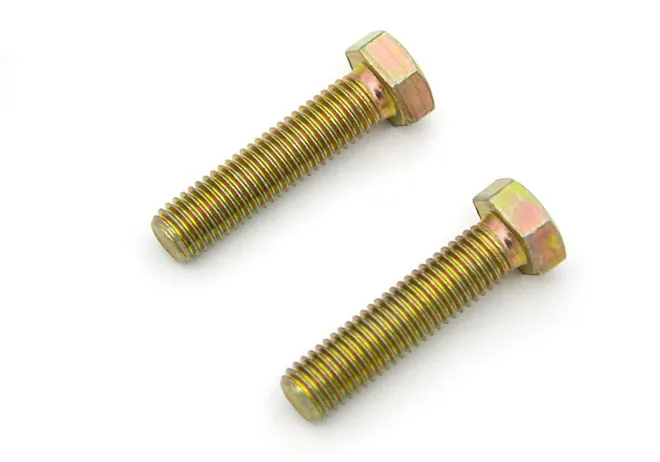Tapered Washers Manufacturer Providing High-Quality Custom Solutions for Your Needs
Sep . 30, 2024 10:12 Back to list
Tapered Washers Manufacturer Providing High-Quality Custom Solutions for Your Needs
The Importance of Tapered Washers in Modern Manufacturing
In the realm of manufacturing and engineering, every component plays a significant role in ensuring the overall functionality and reliability of a system. Among these components, tapered washers have emerged as vital elements in numerous applications, bridging the gap between performance and durability. As manufacturers increasingly seek ways to optimize designs and reduce costs, the demand for high-quality tapered washers has surged, leading to the growth of specialized factories catering to this niche requirement.
What Are Tapered Washers?
Tapered washers, also known as tapered spacers, are mechanical components characterized by a conical shape. Unlike traditional flat washers, the unique design of tapered washers allows them to adapt to varying surface heights and provide better load distribution. This makes them essential in applications where precise alignment and stability are crucial, such as in construction, automotive, and aerospace industries.
When pressure is applied to a bolt or a screw, tapered washers can effectively distribute that pressure evenly across a wider area. This not only enhances the joint strength but also minimizes the risk of material failure, warping, or loosening over time. Consequently, the use of tapered washers leads to enhanced reliability and longevity of mechanical assemblies.
Applications Across Industries
Tapered washers find applications in a diverse range of industries. In construction, they are used in anchoring systems to ensure structural integrity by accommodating variations in substrate levels. The automotive sector relies on tapered washers in suspension systems, where they help absorb shock and maintain alignment under the stresses of road conditions. In the aerospace industry, where safety and precision are paramount, tapered washers are integrated into components like landing gear and fuselage assemblies.
The versatility of tapered washers lies not only in their design but also in their material composition. Factories producing these washers often provide a variety of materials, including stainless steel, carbon steel, and specialized alloys, each chosen for its unique properties that suit different environmental conditions and load requirements.
tapered washers factory

The Manufacturing Process
The production of tapered washers typically involves several key steps, beginning with material selection. Factories often utilize advanced machining techniques, such as CNC (Computer Numerical Control) machining, to achieve the precise tolerances essential for tapered washer effectiveness. The manufacturing process includes cutting, shaping, and finishing stages that ensure the washers conform to industry standards.
Quality control is a critical aspect of tapered washer production. Manufacturers implement rigorous testing procedures to evaluate the structural integrity and performance of their products. This involves subjecting washers to various stress tests, corrosion resistance evaluations, and dimensional accuracy checks to guarantee that they meet or exceed customer specifications.
The Rise of Specialized Factories
As the demand for tapered washers continues to grow, specialized factories dedicated to their production have emerged. These factories often leverage cutting-edge technology and automation to enhance efficiency while ensuring the highest quality standards. By focusing exclusively on tapered washers, these manufacturers can adapt quickly to changing market demands and tailor their offerings to specific industry requirements.
Moreover, the rise of e-commerce and online platforms has made it easier for businesses to source tapered washers from specialized factories worldwide. This has led to increased competition, driving innovation and ensuring that customers have access to the latest advancements in tapered washer design and manufacturing.
Conclusion
In conclusion, tapered washers represent a critical component in modern manufacturing, providing unique advantages in terms of load distribution and stability. As industries continue to evolve, the importance of these washers cannot be overstated. Specialized factories dedicated to producing high-quality tapered washers have emerged, catering to the growing demand and enhancing the overall reliability of mechanical assemblies. By investing in innovative manufacturing practices and maintaining stringent quality control, these factories are poised to play an integral role in the future of engineering and design. As technology progresses, we can expect further advancements in tapered washer production, ensuring that they continue to meet the needs of diverse industries around the globe.
Latest news
-
High-Quality Panel Stud Bolt Reliable Panel Stud Bolt Factory & Suppliers
NewsJul.08,2025
-
High-Precision Fine Thread Locknuts Manufacturer & Supplier Custom Solutions
NewsJul.08,2025
-
PH Imperial Stud Bolt – High Strength Fasteners from Leading Supplier & Factory
NewsJul.07,2025
-
High-Quality Allen Wrench Bolts Leading Factory, Company & Suppliers
NewsJul.07,2025
-
Wholesale Ball Stud Bolt - High Quality Supplier & Factory Price Reliable Wholesale Ball Stud Bolt Company
NewsJul.06,2025
-
High-Strength Alloy Bolts Manufacturer & Supplier Quality Alloy Fasteners Factory
NewsJul.06,2025
